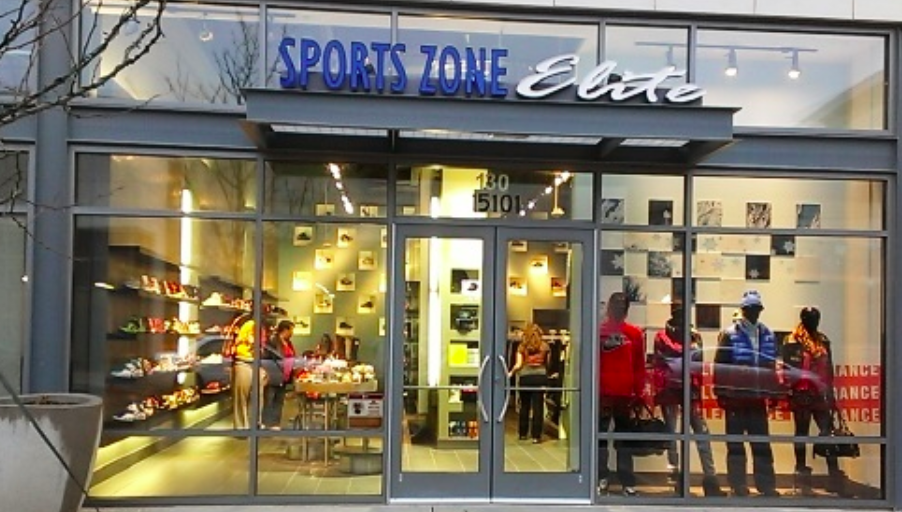Sports Zone Elite, the sneaker chain in Washington, DC and Maryland, became the second retailer in the last month to find its dependence on Nike to be a blessing during good times and a liability during more difficult ones.
The first was Sheikh Shoes, the urban retailer based in Ontario, CA that filed for bankruptcy on December 1.
In its filing Friday in Maryland’s bankruptcy court, Sports Zone noted that the chain launched in 1985 and has operated sneaker and sporting apparel stores at shopping malls in Maryland, Virginia, and the District of Columbia. As recently as September 2017, it operated 28 stores.
The retailer said its financial struggles “date back to the nationwide recession in 2008.” During the recession, sales “slumped” and the retailer was unable to refinance its approximately $4 million balloon note with PNC Bank, N.A. In order to pay down the balloon note in 2010, Michael Syag, the founder and president of Sports Zone, lent the retailer a total of $1.8 million to pay back the remaining amounts due to PNC over the next eighteen months. The loans from Syag remain outstanding.
The company’s CEO is Michael Dahan, who took over that role in February 2015. He has been with the company since 2001 and was previously CFO.
In order to service the debt payments to PNC, Sports Zone attempted to increase its cash flow by expanding its footprint. “Unfortunately,” Sports Zone’s lawyers wrote in court papers, “its expansion was unsuccessful. The expansion left the debtor unable to service debts to various landlords.”
The payments to PNC also caused Sports Zone to fall behind on payments to its vendors, including its most important vendor, Nike. In response, Nike, which accounted for more than half of the retailer’s sales, stopped selling new product to Sports Zone.
In an attempt to resolve its debts to Nike, on or about February 17, 2017, Sports Zone issued a promissory note and executed a security agreement with Nike in the principal amount of $3.7 million. Thereafter, from March to September 2017, Sports Zone made payments of approximately $330,000 per month to Nike. Such payments depleted Sports Zone’s cash on hand, and caused it to fall behind on payments to other vendors.
In an attempt to reduce its operating expenses, Sports Zone in September of this year closed 18 of its stores in September and terminated those leases. On September 18, however, Nike filed a UCC-1 financing statement with the State Corporation Commission of the Commonwealth of Virginia, “in an attempt to perfect its security agreement against the debtor.”
Sports Zone also noted that since September, most vendors had cut off shipments to the chain. Wrote Sports Zone in court papers, “The debtor has not made any significant inventory purchases since September 2017. The debtor has survived by selling its abundant amount of older inventory, and by consolidating the inventory that was formerly for sale at its now-closed stores.”
A separate challenge for Sports Zone has been its hurdles in selling the business, again because of its reliance on Nike. The business has been for sale for over a year. Sports Zone said it “received significant interest from two previous potential purchasers, but those purchasers declined to pursue an acquisition after Nike indicated that it would not sell product to the purchased entity after the acquisition.”
Sports Zone has entered into a letter of intent to sell the company to Halifax of Palisade, LLC, a New Jersey apparel wholesaler. Halifax plans to sell similar product lines but “will not need to purchase inventory from Nike.”
Sports Zone and Halifax are currently negotiating an asset purchase agreement and will use the bankruptcy reorganization process to close the sale as well as settle the company’s overall debts.
Sports Zone also filed “an adversary complaint” against Nike in order to avoid any security interest it may have as a preferential transfer as part of the UCC-1 financing statement.
In requesting the court avoid the transfer, Sports Zone said the transfer to Nike was “for, or on account of, antecedent debts of and/or claims against the Debtor at the time the transfer were made.” Sports Zone also noted that it was insolvent at the time of the transfer and the transfer enabled Nike to receive more than it would have been entitled to receive than if it received payment of such debts and/or claims in a Chapter 7 case as part of the provisions of the bankruptcy code.
With the closings in September, Sports Zone now has 11 stores. One more is scheduled to close in January 2018.
The filing in Maryland listed assets in the range of $500,000 to $1 million and estimated liabilities between $1 million to $10 million.
The company’s unsecured trade creditors, according to court documents are Nike, owed $1.9 million; Adidas, $299,833; New Balance, $192,506; and New Era, $41,832.
Several trade vendors are protected by factors, which are financial firms that take the risks on defaulting receivables for a fee. These vendors include I-Fe Apparel (care of (c/o) Hana Financial), Pasadena, CA, owed $133,638; Blue Print (c/o City Group Commercial Service), $123,847; Bong HWA (c/o Hana Financial), $60,547; and K&S Sportswear, Inc., (c/o The CIT Group), Charlotte, NC; $43,247. The remaining unsecured creditors were largely landlords.
In the case of Sheikh Shoes, the retailer is seeking special preference for Nike to regain shipments from the sneaker giant.
Sheikh Shoes wrote in court papers, “The debtor believes that a successful overall reorganization would maximize the value of the estate, provide for payment to unsecured creditors, and allow the debtor to emerge from chapter 11 with a reorganized and viable ongoing business. However, a successful restructuring that would maintain the debtor’s current business model and without a significant alteration in the debtor’s operations will require the cooperation of Nike.”
Nike holds an unsecured creditor’s claim of $16 million in the Sheikh Shoes case.
Photo courtesy Sports Zone Elite
















